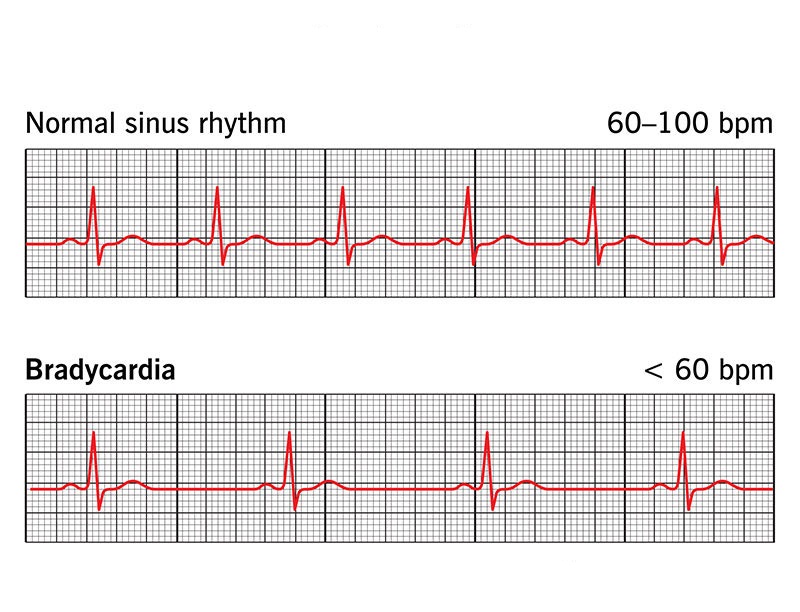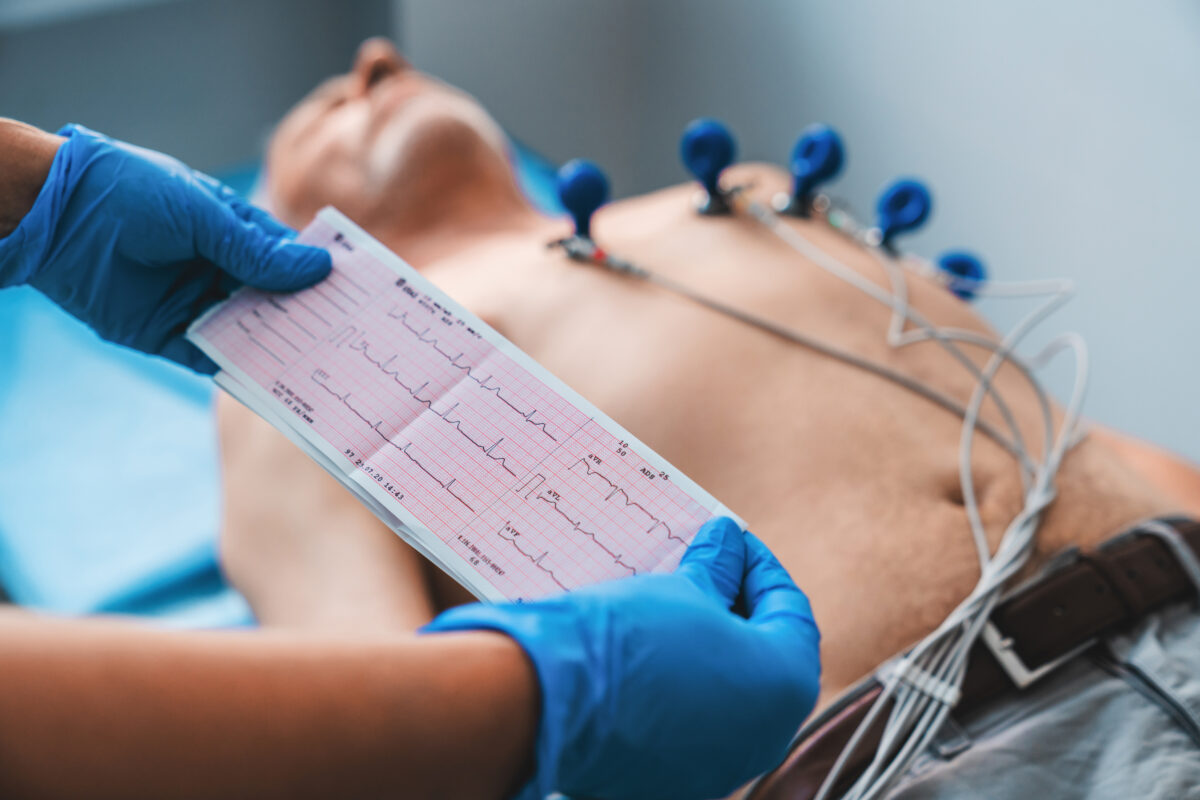This is a health condition in which a person experiences slow heartbeats (under 60 beats per minute). In some cases, this condition does not cause any symptoms or problems, especially if you are in very good physical shape. However, this is a treatable condition.
What is Bradycardia? 
A health condition called bradycardia makes your heart beat less than 60 beats per minute. However, it is considered too slow to keep enough blood throughout the body. In addition, for those who are very active physically, this condition can provoke certain harmful effects.
What is The Difference between Bradycardia and Tachycardia?
These health conditions are opposite (such as high blood pressure and low blood pressure). Therefore, tachycardia causes the heart to beat more than usual but bradycardia causes slower than normal heartbeats.
Who’s Affected by Bradycardia?
While this condition can occur in anyone, people over 65 years old are more likely to develop it. It happens because it is a natural process that your heart rate slows with aging. The only exception is when someone is born with certain genetic conditions that provoke bradycardia. Check below some additional factors that can contribute to or even cause this health condition:
- Inherit from parents
- Use of certain prescription and over-the-counter drugs
- Chest injuries
- Nutritional problems
- Eating disorders and others
How Common is Bradycardia?
This is considered a common health condition in specific people. For example, people over 65 years old and who are very active physically are more likely to develop this condition than others.
Symptoms
In very active physical people usually, asymptomatic bradycardia occurs because the heart is more efficient. However, when the heart cannot compensate, any of the following symptoms can appear. Examples include:
- Shortness of breath
- Fatigue (extreme tiredness)
- Chest pain (angina)
- Heart palpitations (pounding heartbeat)
- Memory problems
- Confusion
- Difficulty concentrating or focusing
- Dizziness
- Lightheadedness
- Fainting
- Irritability or agitation
The symptoms depend on how this condition impacts your brain and heart. For example, the brain gets roughly 15%-20% of the blood that comes from the heart. Thus, if the brain does not receive enough blood flow, it can affect the brain function.
Causes
Bradycardia can occur due to different factors. Check the most common of them below:
- Electrolyte deficiencies – If you do not get enough calcium, potassium, and magnesium it may negatively affect your heart rate.
- Anorexia nervosa
- Inflammation – For example inflammation of the endocarditis (inner lining of the heart), myocarditis (heart muscle), and pericarditis (pericardial sac).
- Infections – The following infections can provoke heart damage. These include strep throat infections and others.
- Rheumatic fever and rheumatic heart disease
- Lyme disease – This condition is also known as borreliosis and it happens due to tick bites. If you are not treating this condition, it may cause heart problems.
- Chagas disease – This is a health condition similar to Lyme disease.
- Sick sinus syndrome
- Heart block – A health condition in which the electrical system of the heart is interrupted.
- Medicines – Including beta-blockers, calcium channel blockers, anti-arrhythmia medicines, narcotic medicines, lithium, antidepressants, and others.
- Heart surgery
- Radiation therapy – This therapy is usually used in cancer treatment but it can also cause radiation heart disease.
Check below for other health conditions that could cause bradycardia:
- Heart attack or failure
- Coronary artery disease
- Duchenne muscular dystrophy
- Long Q-T syndrome
- Lupus
- Rheumatoid arthritis
- Hypothermia
- Sleep apnea
- Hypothyroidism
- Scleroderma
- Intracranial high blood pressure (hypertension)
In addition, this health condition is not contagious, which means it cannot pass from one person to another.
Diagnosis
Healthcare providers usually diagnose this condition based on physical examination and tests.
- Physical examination – During this examination, your doctor will check you for visible symptoms of diseases or any problems. They can also listen to your heart using a stethoscope.
- Electrocardiogram (ECG or EKG) – This is the main test used to diagnose bradycardia. This test involves about 12 electrodes that are sticking to the chest to determine the electrical activity of the heart and print it on paper.
Doctors can also order you to do some additional lab tests. For example:
- Toxicology screen – This test is done to determine substances (including prescription and recreational) that provoke bradycardia or heart damage.
- Troponin – The heart muscle contains a protein called troponin. In case this protein leaks into the blood, it can cause heart damage.
- Thyroid hormone levels – Low thyroid gland function also can provoke bradycardia.
- Electrolyte levels – Measure levels of electrolytes in the blood (including magnesium, potassium, and calcium).
Many of the tests listed below are possible if your doctor suspects you have a health condition that provokes bradycardia.
Treatment
Generally, this condition can be treated and sometimes cured. For example, if you are experiencing bradycardia due to other health conditions, treating it may stop bradycardia. Check below some treatment methods:
Medicines
Physicians can prescribe an injectable medicine such as Atropine, which usually increases the heart rate. The treatment with injections is usually received in a hospital because your doctor needs to monitor you and give additional care if needed. In addition, there are some oral medications that are taken daily to improve heart function.
Temporary Pacing
This treatment option involves a device that is attached to your chest. It uses electrical electrodes that help to improve heartbeats. It is an effective treatment for people who need permanent pacemakers or who experience bradycardia for short periods.
Permanent Pacemaker
When your natural pacemaker cells are not working correctly, a permanent pacemaker is the best way to treat bradycardia, especially for people with sick sinus syndrome. However, this treatment option cannot cure the condition, it is an effective long-term treatment that helps to maintain a healthy heart rate.
Frequently Asked Questions
How to prevent bradycardia?
In some cases, it is impossible to prevent this condition because it is a part of aging. It is possible to prevent bradycardia if it happens due to the following cases. Examples include:
- Infections
- Anorexia nervosa
- Recreational drugs
In other cases, bradycardia occurs spontaneously. That’s why you cannot prevent it.
Is bradycardia an arrhythmia?
The normal heart rate range is considered from 60 to 100 beats per minute for an adult. However, bradycardia is an arrhythmia (irregular heart rhythm) because it causes your heart to beat slower than the normal rate.
When should I go to the emergency room (ER)?
If you experience severe symptoms, you should go to the nearest ER. For example:
- Myocardial infarction
- Dyspnea (shortness of breath)
- Angina (chest pain)
- Fainting
- Dizziness
- Lightheadedness
Ask your healthcare provider if you have any other questions.




